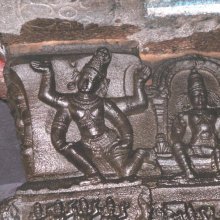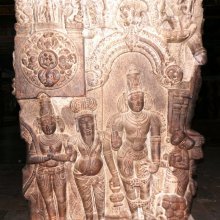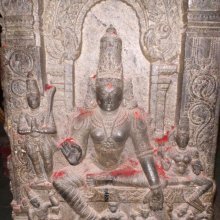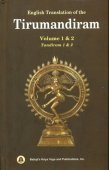Jnana, Jñāna: 43 definitions
Introduction:
Jnana means something in Buddhism, Pali, Hinduism, Sanskrit, Jainism, Prakrit, Marathi, Hindi. If you want to know the exact meaning, history, etymology or English translation of this term then check out the descriptions on this page. Add your comment or reference to a book if you want to contribute to this summary article.
Alternative spellings of this word include Gyan.
Images (photo gallery)
(+5 more images available)
In Hinduism
Pancaratra (worship of Nārāyaṇa)
Source: archive.org: Isvara Samhita Vol 1Jñāna (ज्ञान) or Jñānapāda refers to the first of four sections (pāda) of the Pāñcarātra system of thought.—With jñāna is meant the philosophical structure of its belief system. The best description of all these four aspects of Pāñcarātra (e.g., jñāna) is found in the Padma-saṃhitā, a simplified elaboration of the Jayākhya-saṃhitā.
Source: archive.org: Catalogue of Pancaratra Agama TextsJñāna (ज्ञान) refers to “concentration” (which ought to go hand in hand with dāna and homa for one desiring liberation), as discussed in the fifth chapter of the Agastyasaṃhitā (agastya-suīkṣṇa-saṃvāda edition), an ancient Pāñcarātra Āgama text dealing with the worship of Rāma, Sītā, Lakṣmaṇa and Hanumān. Description of the chapter [pārvatyupadeśa]: [...] Śiva says that Pārvatī must daily worship Rāma with all attention to details. He adds that, while in this kaliyuga merely to chant the name of God could in itself be enough to end all evils, nevertheless she should collect all the necessary paraphernalia for worship sandal-paste, flowers, etc. He repeats that mere concentration alone [jñāna]—without dāna and homa—is not enough for a householder to achieve liberation; both must go hand-in-hand. And, while indeed there may be other rules which apply to brahmacārins and sannyāsins, she must follow her own āśrama. The worship of Rāma should be “saguṇa” and, if it is done with proper materials, it will yield all kinds of happiness here and hereafter.
Source: SriMatham: Vaiṣṇava Iconology based on Pañcarātra ĀgamaFirst of the six Gunas (ṣaḍguṇa); jñānam (Knowledge, omniscience) this is the essential attribute of the Supreme Being.

Pancaratra (पाञ्चरात्र, pāñcarātra) represents a tradition of Hinduism where Narayana is revered and worshipped. Closeley related to Vaishnavism, the Pancaratra literature includes various Agamas and tantras incorporating many Vaishnava philosophies.
Natyashastra (theatrics and dramaturgy)
Source: archive.org: The mirror of gesture (abhinaya-darpana)Jñāna is one of the saṃyutta-hastāni (Twenty-seven combined Hands).

Natyashastra (नाट्यशास्त्र, nāṭyaśāstra) refers to both the ancient Indian tradition (shastra) of performing arts, (natya—theatrics, drama, dance, music), as well as the name of a Sanskrit work dealing with these subjects. It also teaches the rules for composing Dramatic plays (nataka), construction and performance of Theater, and Poetic works (kavya).
Purana and Itihasa (epic history)
Source: Wisdom Library: Skanda-puranaJñāna (ज्ञान, “wisdom”) refers to one of the fifty-six vināyakas located at Kāśī (Vārāṇasī), and forms part of a sacred pilgrimage (yātrā), described in the Kāśīkhaṇḍa (Skanda-purāṇa 4.2.57). He is also known as Jñānavināyaka, Jñānagaṇeśa and Jñānavighneśa. These fifty-six vināyakas are positioned at the eight cardinal points in seven concentric circles (8x7). They center around a deity named Ḍhuṇḍhirāja (or Ḍhuṇḍhi-vināyaka) positioned near the Viśvanātha temple, which lies at the heart of Kāśī, near the Gaṅges. This arrangement symbolises the interconnecting relationship of the macrocosmos, the mesocosmos and the microcosmos.
Jñāna is positioned in the Northern corner of the seventh circle of the kāśī-maṇḍala. According to Rana Singh (source), his shrine is located at “Near the Jnanavapi Kupa, Jnanavapi”. Worshippers of Jñāna will benefit from his quality, which is defined as “the giver of wisdom and knowledge”. His coordinates are: Lat. 25.18647, Lon. 83.00594 (or, 25°11'11.3"N 83°00'21.4"E) (Google maps)
Jñāna, and the other vināyakas, are described in the Skandapurāṇa (the largest of the eighteen mahāpurāṇas). This book narrates the details and legends surrounding numerous holy pilgrimages (tīrtha-māhātmya) throughout India. It is composed of over 81,000 metrical verses with the core text dating from the before the 4th-century CE.
Source: archive.org: Shiva Purana - English TranslationJñāna (ज्ञान) refers to “knowledge”, according to the Śivapurāṇa 2.1.12, while explaining details of worship:—“[...] the root of true knowledge (vijñāna) is unswerving devotion (bhakti). The root of knowledge (jñāna) too is devotion. The root of devotion is good action and the worship of one’s own favourite deity. The root of that is the good preceptor. A good preceptor is secured only through association with good people”.
Source: Cologne Digital Sanskrit Dictionaries: The Purana IndexJñāna (ज्ञान).—Nature and value of;1 superior to sannyāsa;2 two-fold;2 freedom from desire and enmity; leads to renunciation or tyāga; leads to yoga;3 fourteen-fold; the eleven of guṇaśarīra and buddhi, citta, and ahaṅkāra; does not see separately; knows himself; there is, or there is not.4 difficulties to attain;5 the path of.6
- 1) Bhāgavata-purāṇa XI. 19. 1-27.
- 2) Vāyu-purāṇa 91. 114-15.
- 3) Brahmāṇḍa-purāṇa IV. 3. 40, 55; 5. 27.
- 4) Vāyu-purāṇa 102. 61, 75, 107, 123. Viṣṇu-purāṇa I. 22. 46-9. II. 12. 43-4.
- 5) Vāyu-purāṇa 58. 21; 59. 54.
- 6) Ib. 104. 15.

The Purana (पुराण, purāṇas) refers to Sanskrit literature preserving ancient India’s vast cultural history, including historical legends, religious ceremonies, various arts and sciences. The eighteen mahapuranas total over 400,000 shlokas (metrical couplets) and date to at least several centuries BCE.
Shaivism (Shaiva philosophy)
Source: Wisdom Library: ŚaivismJñāna (ज्ञान) refers to “realization through understanding”.
Source: McGill: The architectural theory of the Mānasāra (shaivism)Jñāna (ज्ञान, “theology”) or jñānapada refers to the fourth division of the āgamas.—The four classes of devotees (bhakta) or the states of spiritual life somewhat correspond to the four divisions of the Āgamas and the four modes of sādhana, spiritual practice, they entail. Thus, sālokya corresponds to carya, ritual and moral conduct, sāmīpya to kriyā, architectural and iconographic making, sārūpya to yoga, meditation, and sāyūjya ta jñāna, theology and gnosis.
Jñāna (or, Jñānapada) is also known as Uttara (or, Uttarapada).
Source: Brill: Śaivism and the Tantric TraditionsJñāna (ज्ञान) refers to “knowledge”, according to the Guhyasūtra, the largest book of the Niśvāsa-corpus (a collection of early Śaiva Tantras comprising the Niśvāsamukha, Mūlasūtra, Uttarasūtra, Nayasūtra, and Guhyasūtra).—Accordingly, “[...] (110) Knowing this, one should not give [lightly] the supreme nectar of Lord Śiva. (111) According to this scripture of the Lord, one may attain Śiva by each of the following [practised individually]: initiation, knowledge (jñāna), yoga and caryā in due order. (112) [...] And knowledge (jñāna) is obtained, once one finds a Guru, through his grace. [...] (114) This tetrad has been taught to destroy the dangers of saṃsāra. It should not [lightly] be given to others if one desires supernatural power for oneself”.
Note: Jñāna or Vidyā (gnosis) refers to one of the four categories of the subject-matter of the Āgamas, according to Alexis Sanderson in his 2006 article on the Lākulas (before presenting the vratas in the ninth chapter of the caryāpāda of the Mataṅgapārameśvara).—The Śaivas have conventionally divided the means of liberation taught in the Āgamas, that is to say their subject matter, into the four categories, ritual (kriyā), doctrine or gnosis (jñāna, vidyā), meditation (yoga), and ascetic observance and other rules governing the conduct of the various classes and kinds of initiate (caryā).

Shaiva (शैव, śaiva) or Shaivism (śaivism) represents a tradition of Hinduism worshiping Shiva as the supreme being. Closely related to Shaktism, Shaiva literature includes a range of scriptures, including Tantras, while the root of this tradition may be traced back to the ancient Vedas.
Vastushastra (architecture)
Source: McGill: The architectural theory of the MānasāraKriyā (ज्ञान).—This jñāna is specifically architectural knowledge, which in turn can be distinguished as skills of the craft (the “how”) and its theoretical principles (the “what”). These are learned by the sthapati in his young age (that is, before he ean be called sthapati) through apprenticeship at the workshop and the work-site.

Vastushastra (वास्तुशास्त्र, vāstuśāstra) refers to the ancient Indian science (shastra) of architecture (vastu), dealing with topics such architecture, sculpture, town-building, fort building and various other constructions. Vastu also deals with the philosophy of the architectural relation with the cosmic universe.
Vaishnavism (Vaishava dharma)
Source: Pure Bhakti: Bhagavad-gita (4th edition)Jñāna (ज्ञान) refers to “(1) Knowledge; that which helps one know something (18.18) (2) Knowl-edge that leads to impersonal liberation, which is based on the soul’s distinction from matter and its identity with brahma (3) Transcendental knowledge of one’s relationship with Kṛṣṇa”. (cf. Glossary page from Śrīmad-Bhagavad-Gītā).
Source: Pure Bhakti: Bhajana-rahasya - 2nd EditionJñāna (ज्ञान) refers to:—(1) knowledge in general; (2) knowledge leading to impersonal liberation. (cf. Glossary page from Bhajana-Rahasya).
Source: Pure Bhakti: Brhad BhagavatamrtamJñāna (ज्ञान) refers to:—Knowledge; knowledge that leads to impersonal liberation; transcendental knowledge of one’s relationship with Kṛṣṇa. (cf. Glossary page from Śrī Bṛhad-bhāgavatāmṛta).
Source: Prabhupada Books: Sri Caitanya CaritamrtaJñāna (ज्ञान) or Jñānaśakti refers to “transcendental knowledge”, according to the Śrī Caitanya Caritāmṛta 2.20.246 (“The Science of the Absolute Truth”).—(Cf. Śaktyāveśa).—The śaktyāveśa-avatāras are categorized into (1) forms of divine absorption (bhagavad-āveśa), such as Kapiladeva or ṛṣabhadeva, and (2) divinely empowered forms (śaktyāveśa), of whom seven are foremost: [i.e., (4) Catuḥsana, or the Kumāras, specifically empowered to distribute transcendental knowledge (jñāna-śakti), [...]”.

Vaishnava (वैष्णव, vaiṣṇava) or vaishnavism (vaiṣṇavism) represents a tradition of Hinduism worshipping Vishnu as the supreme Lord. Similar to the Shaktism and Shaivism traditions, Vaishnavism also developed as an individual movement, famous for its exposition of the dashavatara (‘ten avatars of Vishnu’).
Ayurveda (science of life)
Source: gurumukhi.ru: Ayurveda glossary of termsJñāna (ज्ञान):—Knowing, understanding, becoming acquainted with proficiency , learning

Āyurveda (आयुर्वेद, ayurveda) is a branch of Indian science dealing with medicine, herbalism, taxology, anatomy, surgery, alchemy and related topics. Traditional practice of Āyurveda in ancient India dates back to at least the first millenium BC. Literature is commonly written in Sanskrit using various poetic metres.
General definition (in Hinduism)
Source: WikiPedia: Hinduism1) Jnana (ज्ञान): Knowledge of the eternal and real
2) Jñāna is a Sanskrit word that means knowledge. It has various nuances of meaning depending on the context, and is used in a number of different Indian religions. The idea of jnana centers around a cognitive event which is recognized when experienced. It is knowledge inseparable from the total experience of reality, especially a total reality, or supreme being within Mahesha-dhama (and/or material world) such as Siva-Sakti.
etymology: Jñāna or gñāna (/dʒəˈnɑːnə/,[1] Sanskrit; Pali: ñāṇa)
In Buddhism
Mahayana (major branch of Buddhism)
Source: Wisdom Library: Maha Prajnaparamita SastraJñāna (ज्ञान) refers to a set of “eleven knowledges”, according to the 2nd century Mahāprajñāpāramitāśāstra chapter 38.
The Bodhisattva-mahāsattva must fulfill completely the eleven knowledges (ekādaśa-jñāna):
- the knowledge of things (dharmajñāna),
- subsequent knowledge (anvayajñāna),
- the knowledge of another’s mind (paracittajñāna),
- conventional knowledge (saṃvṛtijñāna),
- the knowledge of suffering (duḥkhajñāna),
- the knowledge of the origin of suffering (samudayajñāna),
- the knowledge of the cessation of suffering (nirodhajñāna),
- the knowledge of the path of the cessation of suffering (mārgajñāna),
- the knowledge of the cessation of the impurities (kṣayajñāna),
- the knowledge of the non-rearising of the impurities (anutpādajñāna),
- the knowledge conforming to reality (yathābhūtajñāna).
Note: According to the oldest sources, the Buddhist texts call for a number of knowledges (Sanskrit, jñāna; Pāli, ñāṇa) which the scholastics will do their utmost to classify and define.
Source: academia.edu: A Study and Translation of the GaganagañjaparipṛcchāJñāna (ज्ञान) refers to “knowledge”, according to the Gaganagañjaparipṛcchā: the eighth chapter of the Mahāsaṃnipāta (a collection of Mahāyāna Buddhist Sūtras).—Accordingly as The Lord said: “O Śāriputra, in the buddha-field of the Tathāgata Ekaratnavyūha, there is a Bodhisattva, the great being Gaganagañja who is resplendent by the splendor of merit (puṇya-tejas), [...] who enters the intention of thought of all living beings as adorned with knowledge (jñāna), penetrates the roots of good of all living beings as adorned with consciousness (buddhi-alaṃkṛta), is purified in the realm of five eyes adorned with the [divine] sight (cakṣus), [...]”.

Mahayana (महायान, mahāyāna) is a major branch of Buddhism focusing on the path of a Bodhisattva (spiritual aspirants/ enlightened beings). Extant literature is vast and primarely composed in the Sanskrit language. There are many sūtras of which some of the earliest are the various Prajñāpāramitā sūtras.
Tibetan Buddhism (Vajrayana or tantric Buddhism)
Source: academia.edu: The Structure and Meanings of the Heruka MaṇḍalaJñāna (ज्ञान) is the name of a Vīra (hero) who, together with the Ḍākinī named Sarasvatī forms one of the 36 pairs situated in the Vajracakra, according to the 10th century Ḍākārṇava chapter 15. Accordingly, the vajracakra refers to one of the four divisions of the sahaja-puṭa (‘innate layer’), situated within the padma (lotus) in the middle of the Herukamaṇḍala. The 36 pairs of Ḍākinīs and Vīras [viz., Jñāna] each have one face and four arms; they hold a skull bowl, a skull staff, a small drum and a knife; they are dark-bluish-black in color.
Source: OSU Press: Cakrasamvara Samadhi1) Jñāna (ज्ञान) or Pañcajñāna refers to the “five wisdoms”, according to the Saṃvaramaṇḍala of Abhayākaragupta’s Niṣpannayogāvalī, p. 45 and n. 145; (Cf. Cakrasaṃvaratantra, Gray, David B., 2007).—The crown of five skulls symbolize the pañcajñāna, "The Five Wisdoms":
- ādarśa-jñāna, "mirror-like wisdom",
- samatā-jñāna, "the wisdom of equality",
- pratyavekṣā-jñāna, "discriminating wisdom",
- kṛtyanuṣṭhāna-jñāna, "the wisdom of action",
- tathatā-jñāna, "the wisdom of thusness".
2) Jñana (ज्ञन) or Jñanatīrtha refers to one of the “eleven holy bathing places” (Puṇyatīrtha), according to the Guru Mandala Worship (maṇḍalārcana) ritual often performed in combination with the Cakrasaṃvara Samādhi, which refers to the primary pūjā and sādhanā practice of Newah Mahāyāna-Vajrayāna Buddhists in Nepal.

Tibetan Buddhism includes schools such as Nyingma, Kadampa, Kagyu and Gelug. Their primary canon of literature is divided in two broad categories: The Kangyur, which consists of Buddha’s words, and the Tengyur, which includes commentaries from various sources. Esotericism and tantra techniques (vajrayāna) are collected indepently.
Buddhist philosophy
Source: Google Books: A History of Indian Logic (Buddhist Philosophy)Jñāna (ज्ञान) refers to “knowledge” (of inference) (within a debate), according to Upāyakauśalyahṛdaya, an ancient work on the art of debate composed by Bodhisattva Nāgārjuna.—The first chapter [i.e., “an elucidation of debate (vāda-visadīkaraṇa)”] consists of eight sections which treat respectively of (1) an example (udāharaṇa), (2) a tenet, truth or conclusion (siddhānta), (3) the excellence of speech (vākyapraśaṃsā), (4) the defect of speech (vākya-doṣa), (5) the knowledge of inference (anumāna or hetu-jñāna), (6) the appropriate or opportune speech (samayocita-vākya), (7) the fallacy (hetvābhāsa) and (8) the adoption of a fallacious reason (duṣṭa-vākyānusaraṇa).
Source: Wisdom Experience: Mind (An excerpt from Science and Philosophy)Jñāna (ज्ञान) refers to “(a unique moment of) consciousness”.—The term “mind” in Western contexts suggests a single entity that endures over time and has various capacities, dispositions, or features. In contrast, the Buddhist sources cited by our authors maintain that mind is episodic, such that a mind (citta) is a continuum (santāna) of mental moments, each moment causally emerging from the previous moment and acting as a cause for the subsequent moment. Each mind is thus a unique moment of consciousness (jñāna) or awareness (saṃvitti). The analysis of the nature of mind is thus actually an analysis of what, in many Western contexts, would be a moment of mind or a “mind event.” In a way that can be additionally confusing, Buddhist authors will often speak of plural “minds” that pertain to the same person at different points of time or in different contexts, such as the mind in a moment of visual consciousness or the mind in a moment of one-pointed concentration. [...]
-
General definition (in Buddhism)
Source: Wisdom Library: Dharma-samgraha1) Jñāna (ज्ञान, “knowledge”) or jñānapāramitā represents the last of the “ten perferctions” (daśapāramitā) as defined in the Dharma-saṃgraha (section 18). The Dharma-samgraha (Dharmasangraha) is an extensive glossary of Buddhist technical terms in Sanskrit (e.g., daśa-pāramitā and jñāna). The work is attributed to Nagarjuna who lived around the 2nd century A.D.
Jñāna or Jñānavaśitā refers to the “mastery of aspiration” and represents one of the “ten masteries of the Bodhisattvas” (vaśitā) as defined in the Dharma-saṃgraha (section 74).
Jñāna or Jñānabala refers to the “the strength of knowledge” and represents one of the “ten strengths of the Bodhisattvas” (bala) as defined in the Dharma-saṃgraha (section 75).
2) Jñāna or Daśajñāna refers to the “ten knowledges” as defined in the Dharma-saṃgraha (section 93):
- duḥkha-jñāna (knowledge of suffering),
- samudaya-jñāna (knowledge of arising),
- nirodha-jñāna (knowledge of cessation),
- mārga-jñāna (knowledge of path),
- dharma-jñānam (knowledge of dharma),
- anvaya-jñāna (knowledge of conformity),
- saṃvṛti-jñāna (knowledge of the concealed),
- paracitta-jñāna (knowledge of others’ minds),
- kṣaya-jñāna (knowledge of destruction),
- anutpāda-jñāna (and knowledge of non-production).
3) Jñāna or Pañcajñāna also refers to the “five knowledges” as defined in the Dharma-saṃgraha (section 94):
- ādarśana-jñāna (mirror-like knowledge),
- samatā-jñāna (knowledge of equality),
- pratyavekṣaṇā-jñāna (knowledge of reflection),
- kṛtyānuṣṭhāna-jñāna (knowledge of performance),
- suviśuddha-dharma-dhātu-jñāna (knowledge of the very pure dharma element).
4) Jñāna or Trijñāna also refers to “three kinds of knowledge” as defined in the Dharma-saṃgraha (section 114):
- avikalpaka (undoubting),
- vikalpa-samabhāva-bodhaka (awakening from the nature of doubt),
- satyārthopāya-parokṣa (a secret means to truth and welfare).
In Jainism
General definition (in Jainism)
Source: archive.org: Jaina YogaJñāna (ज्ञान, “knowledge”) as in jñāna-mada refers to “pride in one’s knowledge” and represents one of the eight forms of vainglory (mada), according to Samantabhadra in his Ratna-Karaṇḍa-śrāvakācāra (with commentary of Prabhācandra). These eight madas are included in the twenty-five blemishes (dṛg-doṣas), which are generally held to be the eight madas, the three mūḍhatās, the six anāyatanas, and the eight doṣas.
Source: archive.org: TrisastisalakapurusacaritraJnana (ज्नन) refers to “understanding in accordance with the principles” and represents one of the three aspects of yoga (self-concentration), according to chapter 4.5 [dharmanātha-caritra] of Hemacandra’s 11th century Triṣaṣṭiśalākāpuruṣacaritra: an ancient Sanskrit epic poem narrating the history and legends of sixty-three illustrious persons in Jainism.
Accordingly, as Dharma-nātha said in his sermon on the kaṣāyas:—“Emancipation (mokṣa) is the chief of the four objects of existence and the source of it is self-concentration (yoga), and it (yoga) is the three jewels having the form of jnana, śraddhāna, and caritra. Understanding in accordance with the Principles is jñāna; right-belief is saṃyakśraddhā; and abandonment of all censurable activities is caritra. The Soul alone—or rather, the right-belief, knowledge, and conduct of a yati, since it (the soul) really consists of them—rules the body. If anyone knows the soul in himself by himself because of the freedom from delusion, that itself is his right-conduct, -knowledge, and -belief. [...]”.
Source: Encyclopedia of Jainism: Tattvartha SutraJñāna (ज्ञान, “knowledge”).—How many types of knowledge (jñāna) are there? Knowledge is of five types namely: mind-based / empirical (mati), verbal / scriptural (śruta), clairvoyance (avadhi), mental modes / telepathy (manaḥparyaya) and omniscience (kevala).
Source: The University of Sydney: A study of the Twelve ReflectionsJñāna (ज्ञान) refers to “knowledge (of what is beyond the senses)”, according to the 11th century Jñānārṇava, a treatise on Jain Yoga in roughly 2200 Sanskrit verses composed by Śubhacandra.—Accordingly, “The three worlds, which are made foolish by the action of the poison of lust, are fast asleep in this gaping mouth of Yama’s serpent which is marked by fangs of destruction. While this one whose disposition is pitiless is devouring everyone, certainly there is no way out from this for you, noble fellow, by any means [even] with some difficulty without knowledge of what is beyond the senses [com.—atīndriya-jñāna—‘knowledge of what is beyond the senses’]. [Thus ends the reflection on] helplessness”.
Synonyms: Bodha.

Jainism is an Indian religion of Dharma whose doctrine revolves around harmlessness (ahimsa) towards every living being. The two major branches (Digambara and Svetambara) of Jainism stimulate self-control (or, shramana, ‘self-reliance’) and spiritual development through a path of peace for the soul to progess to the ultimate goal.
Languages of India and abroad
Marathi-English dictionary
Source: DDSA: The Molesworth Marathi and English Dictionaryjñāna (ज्ञान).—n (S) Knowledge in general; any science or objective matter appropriate to the exercise of the understanding or mind. 2 Knowledge of a specific and religious kind,--that which is derived from meditation and the study of philosophy; which teaches man the divine origin and nature of his immaterial portion, and the unreality of corporal enjoyments, sufferings, and experiences, and the illusoriness of the external and objective universe; and which, sanctifying him during life from earthly attachments and fleshly affections, accomplishes for him after death emancipation from individual existence and reunion with the universal spirit. 3 Understanding; i.e. the intellectual percipience or faculty, or the product of the application and exercise of it--sense, sapience, judgment, intelligence, information, or knowledge. 4 An impression upon the understanding; an apprehension or a conviction of; an understanding or a conception of.
Source: DDSA: The Aryabhusan school dictionary, Marathi-Englishjñāna (ज्ञान).—Understanding. Knowledge. Knowledge of a religious kind.
Marathi is an Indo-European language having over 70 million native speakers people in (predominantly) Maharashtra India. Marathi, like many other Indo-Aryan languages, evolved from early forms of Prakrit, which itself is a subset of Sanskrit, one of the most ancient languages of the world.
Sanskrit dictionary
Source: DDSA: The practical Sanskrit-English dictionaryJñāna (ज्ञान).—[jñā-bhāve lyuṭ]
1) Knowing, understanding, becoming acquainted with, proficiency; सांख्यस्य योगस्य च ज्ञानम् (sāṃkhyasya yogasya ca jñānam) Mālatīmādhava (Bombay) 1.7.
2) Knowledge, learning; तथेन्द्रियाकुलीभावे ज्ञेयं ज्ञानेन शुध्यति (tathendriyākulībhāve jñeyaṃ jñānena śudhyati) Mahābhārata (Bombay) 12.24.2; बुद्धिर्ज्ञानेन शुध्यति (buddhirjñānena śudhyati) Manusmṛti 5.19; ज्ञाने मौनं क्षमा शत्रौ (jñāne maunaṃ kṣamā śatrau) R.1.22.
3) Consciousness, cognizance, knowledge; ज्ञानतोऽज्ञानतो वापि (jñānato'jñānato vāpi) Manusmṛti 8.288 knowingly or unknowingly, consciously or unconsciously.
4) Sacred knowledge; especially, knowledge derived from meditation on the higher truths of religion and philosophy which teaches man how to understand his own nature and how he may be reunited to the Supreme Spirit (opp. karman); cf. ज्ञानयोग (jñānayoga) and कर्मयोग (karmayoga) in Bhagavadgītā (Bombay) 3.3.
5) The organ of intelligence, sense, intellect; कच्चिज्ज्ञानानि सर्वाणि प्रसन्नानि तवाच्युत (kaccijjñānāni sarvāṇi prasannāni tavācyuta) Mahābhārata (Bombay) 12.54.18.
6) Conscience.
7) The Supreme spirit.
8) An epithet of Viṣṇu.
9) The Vedas taken collectively.
1) Means of knowing; औत्पक्तिकस्तु शब्दस्यार्थेन सम्बन्धस्तस्य ज्ञानम्° (autpaktikastu śabdasyārthena sambandhastasya jñānam°) | MS.1.1.5.
11) An opinion, a view; बलदेवस्य वाक्यं तु मम ज्ञाने न युज्यते (baladevasya vākyaṃ tu mama jñāne na yujyate) Mahābhārata (Bombay) 5.4.3.
Derivable forms: jñānam (ज्ञानम्).
Source: Cologne Digital Sanskrit Dictionaries: Edgerton Buddhist Hybrid Sanskrit DictionaryJñāna (ज्ञान).—nt. (= Sanskrit; Pali ñāṇa), knowledge; for dis-tinction from vijñāna see the latter; five j° (of a Tathā- gata) Mahāvyutpatti 109, listed 110—114 and Dharmasaṃgraha 94, dharma- dhātuviśuddhiḥ (Dh. suviśuddhadharmadhātu-jñānam, No. 5), ādarśa-jñānam (Dh. ādarśana-j°, No. 1), samatā-j° (Dh. No. 2), pratyavekṣaṇā-j° (Dh. No. 3), kṛtyānusthāna-j° (Dh. °ṣṭhāna°, No. 4); ten j° Dharmasaṃgraha 93 and Mahāvyutpatti 1233— 43, eleven Śatasāhasrikā-prajñāpāramitā 1440.10 ff.: duḥkha-j° (Mahāvyutpatti No. 5), samu- daya-(Mahāvyutpatti 6), nirodha-(Mahāvyutpatti 7), mārga-(Mahāvyutpatti 8), dharma- (Śatasāhasrikā-prajñāpāramitā 7, Mahāvyutpatti 1), anvaya-(Śatasāhasrikā-prajñāpāramitā 8, misprinted annaya-; Mahāvyutpatti 3), saṃvṛti- (Śatasāhasrikā-prajñāpāramitā 9 erroneously saṃvṛtti; Mahāvyutpatti 4), [Page245-a+ 71] paracitta-(Mahāvyutpatti 2; Śatasāhasrikā-prajñāpāramitā 10, paricaya-! = Pali paricce Dīghanikāya (Pali) iii.277.6, expl. Śatasāhasrikā-prajñāpāramitā 1441.20 as pratipakṣa-j° confirming paracitta-), kṣaya (Śatasāhasrikā-prajñāpāramitā 5; Mahāvyutpatti 9, akṣaya), anutpāda- (Śatasāhasrikā-prajñāpāramitā 6, Mahāvyutpatti 10); No. 11 in Śatasāhasrikā-prajñāpāramitā is given as yathāruta-j° 1440.13, but yathākata-j° 1441:21, explained tathāgatasya sarvākārajñatā-j° (perhaps read yathābhūta-j° ?); Abhidharmakośa LaV-P. vii.11 has the ten as in Dharmasaṃgraha and Mahāvyutpatti, in slightly different order, reading kṣaya-j° for No. 9; three jñāna Dharmasaṃgraha 114: avikalpakam, vikalpasama- bhāvabodhakam, satyārthopāyaparokṣam. Cf. also pañ- cajñānika.
Source: Cologne Digital Sanskrit Dictionaries: Shabda-Sagara Sanskrit-English DictionaryJñāna (ज्ञान).—n.
(-naṃ) 1. Knowledge in general. 2. Knowledge of a specific and religious kind, that which is derived from meditation, and the study of philosophy, which teaches man the devine nature and origin of his immaterial part, with the unreality of corporal enjoyments or worldly forms, and which, separating him during life from terrestrial objects, secures him, after death, a final emancipation from existence, and reunion with the universal spirit. 3. Cognizance, conscionsness. 4. The organ of intelligence, sense. 5. Learning. E. jñā to know, aff. bhāve lyuṭ.
Source: Cologne Digital Sanskrit Dictionaries: Benfey Sanskrit-English DictionaryJñāna (ज्ञान).—i. e. jñā + ana, n. 1. Knowledge, [Mānavadharmaśāstra] 2, 13. 2. Superior knowledge, [Bhagavadgītā, (ed. Schlegel.)] 3, 3. 3. Consciousness, Mahābhārata 1, 5827. 4. Intention, [Mānavadharmaśāstra] 11, 145.
Source: Cologne Digital Sanskrit Dictionaries: Cappeller Sanskrit-English DictionaryJñāna (ज्ञान).—[neuter] knowing, understanding, knowledge, [especially] higher knowledge, science, wisdom; conscience, organ of intelligence or sense. Abstr. tva [neuter]
Source: Cologne Digital Sanskrit Dictionaries: Monier-Williams Sanskrit-English Dictionary1) Jñāna (ज्ञान):—[from jñā] n. knowing, becoming acquainted with, knowledge, ([especially]) the higher knowledge (derived from meditation on the one Universal Spirit), [Śāṅkhāyana-śrauta-sūtra xiii; Gobhila-śrāddha-kalpa; Manu-smṛti] etc.
2) [v.s. ...] ‘knowledge about anything cognizance’ See -tas and a- (jñānād a-jñānād vā, knowingly or ignorantly, [xi, 233])
3) [v.s. ...] conscience, [Mahābhārata]
4) [v.s. ...] = nendriya, [Kaṭha-upaniṣad vi, 10]
5) [v.s. ...] engaging in ([genitive case] e.g. sarpiṣas, ‘in sacrifice with clarified butter’), [Pāṇini 2-2, 10], [vArttika], [Patañjali]
6) [v.s. ...] Name of a Śakti, [Rasikaramaṇa xiv, 36; Rāmatāpanīya-upaniṣad i, 90 [Scholiast or Commentator]]
7) Jñānā (ज्ञाना):—[from jñāna > jñā] f. idem, [Pañcarātra iii, 2, 30; Rāmapūjās.]
Source: Cologne Digital Sanskrit Dictionaries: Yates Sanskrit-English DictionaryJñāna (ज्ञान):—(naṃ) 1. n. Knowledge in general.
Source: DDSA: Paia-sadda-mahannavo; a comprehensive Prakrit Hindi dictionary (S)Jñāna (ज्ञान) in the Sanskrit language is related to the Prakrit words: Jāṇa, Jāṇaṇa, Jāṇayā, Ṇāṇa, Muṇaṇa.
[Sanskrit to German]
Sanskrit, also spelled संस्कृतम् (saṃskṛtam), is an ancient language of India commonly seen as the grandmother of the Indo-European language family (even English!). Closely allied with Prakrit and Pali, Sanskrit is more exhaustive in both grammar and terms and has the most extensive collection of literature in the world, greatly surpassing its sister-languages Greek and Latin.
Hindi dictionary
Source: DDSA: A practical Hindi-English dictionaryJñāna (ज्ञान) [Also spelled gyan]:—(nm) knowable, learning; sense; ~[gamya] knowable, perceptible; intelligible, ~[gocara] knowable, perceptible; ~[cakṣu] the inner vision; one who is blessed with intellect; ~[dātā] a preceptor, giver of knowledge; ~[pipāsā] thirst for knowledge; hence ~[pipāsu] (nm); ~[mīmāṃsā] epistemology; ~[vāna] learned, scholarly; -[sādhana] medium or means of perception or acquisition of knowledge; -[sādhanā] pursuit of knowledge.
...
Kannada-English dictionary
Source: Alar: Kannada-English corpusJñāna (ಜ್ಞಾನ):—
1) [noun] the process of perceiving, knowing and, understanding.
2) [noun] the state of knowing.
3) [noun] acquaintance with facts.
4) [noun] the state of being conscious; awareness of one’s own feelings, what is happening around one, etc.; consciousness.
5) [noun] the totality of one’s thoughts, feelings, and impressions; conscious mind.
6) [noun] the spiritual or philosophical knowledge.
7) [noun] the systematised knowledge of a learned person, exhibiting accuracy, critical ability, and thoroughness; erudition.
8) [noun] the knowledge attained by scholars, collectively.
9) [noun] the Supreme Spirit.
10) [noun] the Veda (collectively all the four).
Kannada is a Dravidian language (as opposed to the Indo-European language family) mainly spoken in the southwestern region of India.
See also (Relevant definitions)
Starts with (+380): Jnana Yoga, Jnanabala, Jnanabalaparvatateja, Jnanabaru, Jnanabhairavitantra, Jnanabhakti, Jnanabhaskara, Jnanabhaskarateja, Jnanabhaskare shadvargaphalam, Jnanabhava, Jnanabhavatva, Jnanabhikshu, Jnanabhinirhrita, Jnanabhoga, Jnanabhrashta, Jnanabhumika, Jnanabhushita, Jnanabhyasa, Jnanabhyasi, Jnanabija.
Ends with (+531): Abhijnajnana, Abhijnana, Abhinibodhikajnana, Abhyanujnana, Acintyajnana, Adarshajnana, Adarshanajnana, Addajnana, Adhivijnana, Adhyatmajnana, Advayajnana, Adyajnana, Aharavijnana, Aharyajnana, Aishvaryajnana, Ajnana, Ajnanajnana, Akarajnana, Akaravijnana, Akhandajnana.
Full-text (+1304): Jnanamudra, Jnananutpada, Pancajnana, Atmajnana, Jnanagamya, Tattvajnana, Brahmajnana, Dharmajnana, Ajnana, Purushajnana, Jnanavasthita, Jnanamaya, Aparishesha, Jnanendriya, Jnanin, Prajnana, Samata, Jnanadipa, Jnanatva, Jnanabhaskara.
Relevant text
Search found 184 books and stories containing Jnana, Jñāna, Jñānā; (plurals include: Jnanas, Jñānas, Jñānās). You can also click to the full overview containing English textual excerpts. Below are direct links for the most relevant articles:
Taittiriya Upanishad Bhashya Vartika (by R. Balasubramanian)
Verse 2.58 < [Book 2 - Brahmavallī]
Verse 2.96 < [Book 2 - Brahmavallī]
Verse 2.649 < [Book 2 - Brahmavallī]
Shrimad Bhagavad-gita (by Narayana Gosvami)
Verse 9.12 < [Chapter 9 - Rāja-guhya-yoga (Yoga through the most Confidential Knowledge)]
Verse 18.21 < [Chapter 18 - Mokṣa-yoga (the Yoga of Liberation)]
Verse 4.39 < [Chapter 4 - Jñāna-Yoga (Yoga through Transcendental Knowledge)]
Nirvikalpaka Pratyaksha (study) (by Sujit Roy)
Garga Samhita (English) (by Danavir Goswami)
Verses 6.19.11-13 < [Chapter 19 - In the First Fortress of Dvārakā, the Glories of Līlā-sarovara, etc.]
Verses 2.13.11-14 < [Chapter 13 - The Story of Śeṣa]
Verse 2.7.19 < [Chapter 7 - Kidnapping of the Calves and Cowherd Boys]
Gitartha Samgraha (critical Study) (by Partha Sarathi Sil)
5. Jñānaṣaṭka in the Gītārthasaṅgraha < [Chapter 4 - Critical Study of the Gītārthasaṅgraha]
3. Karmaṣaṭka in the Gītārthasaṅgraha < [Chapter 4 - Critical Study of the Gītārthasaṅgraha]
4. Bhaktiṣaṭka in the Gītārthasaṅgraha < [Chapter 4 - Critical Study of the Gītārthasaṅgraha]
Tattvartha Sutra (with commentary) (by Vijay K. Jain)
Verse 1.24 - Differences between the two kinds of telepathy < [Chapter 1 - Right Faith and Knowledge]
Verse 1.9 - Right knowledge (samyagjñāna) < [Chapter 1 - Right Faith and Knowledge]
Verse 1.32 - Wrong knowledge is whimsical < [Chapter 1 - Right Faith and Knowledge]
Related products
(+4 more products available)











